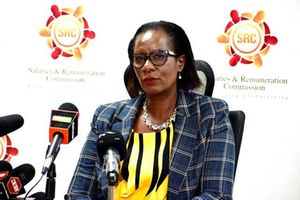State aiming to kill parties by cutting funds, says ODM

National Assembly Public Accounts chairperson John Mbadi during the session at Parliament buildings on August 24, 2023.
What you need to know:
- ODM says the reduced budget is a clear demonstration of the government's intent to cripple all key institutions of democracy.
- Parties are funded by the State to promote democracy, promote civic education and other electoral processes.
Mr Raila Odinga’s ODM has warned of plans to kill multiparty democracy after the National Assembly “instigated” by the Kenya Kwanza administration slashed the allocation to the Political Parties Fund by Sh867 million in Supplementary Budget I for the current financial year that was passed late last year.
Orange Democratic Movement (ODM) chairman John Mbadi, who is a nominated MP, and Secretary-General Edwin Sifuna, who is also the Nairobi Senator, protested the “illegal” budget cuts as it emerged that the amount allocated for political parties in 2023/24 is less than the Sh884.35 million that they received in 2022/23.
This, said Mr Mbadi, goes against the principle that budgets should be progressive.
ODM’s concerns are shared by Registrar of Political Parties (RPP) Ms Anne Nderitu, who, in a document presented to the National Assembly, said the budget cuts aggravate an already dire situation in which the government is yet to comply with the requirement of the law in funding parties.
“It was a mistake to reduce the funding considering that, at the time the cuts were effected, parties were already implementing their work plans,” said Mr Mbadi.
Political parties are required to submit to the Office of the RPP (ORPP) their work plans at the beginning of every financial year for approval and financing.
By the time the cuts came, the ORPP had already approved the parties’ work plans.
“We do not know where the parties’ budget cut proposals came from because the supplementary estimates that the National Treasury presented to the National Assembly did not include reducing the political parties fund budget,” says Mr Mbadi.
Parties are funded by the State to promote democracy, promote civic education and other electoral processes, facilitate participation by citizens in political life, popularisation of policies of the parties, payment of rent for party offices, payment of salaries for staff and other administrative expenses. This means that these programmes will be affected by the budget cuts.
Section 24 (1) (a) of the Political Parties Act of 2011 provides that no less than 0.3 percent of the national government’s share of revenue as divided by the annual Division of Revenue Act shall be allocated to the Political Parties Fund. However, the National Treasury is yet to comply with this provision.
The law goes on to state that 95 per cent of the kitty is to be shared equitably among the qualifying political parties, with five percent financing the operations of the ORPP, which manages the fund.
If the law was to be followed, the allocation to the Political Parties Fund should have been Sh5.3 billion based on the Sh1.67 trillion most recent audited national government revenue for 2019/20 as approved by the National Assembly.
However, in the current financial year, the fund’s budget as appropriated in June 2023 by the National Assembly was Sh1.48 billion before it was reduced to Sh608.3 million in the supplementary budget.
Mr Sifuna said that the reduced budget is “a clear demonstration of the regime’s intent to cripple all key institutions of democracy from parliament to judiciary to the political parties.”
Ms Nderitu, in her submission to the National Assembly, faulted the national government for failing to comply with the requirements of the Political Parties Act while allocating money to the Political Parties Fund.
“The Office of the Registrar of Political Parties has been engaging the National Treasury and parliament through various submissions and correspondences that the government has not complied with the law,” said Ms Nderitu, highlighting the “critical roles that political parties use the fund for as spelt out in the law.”





